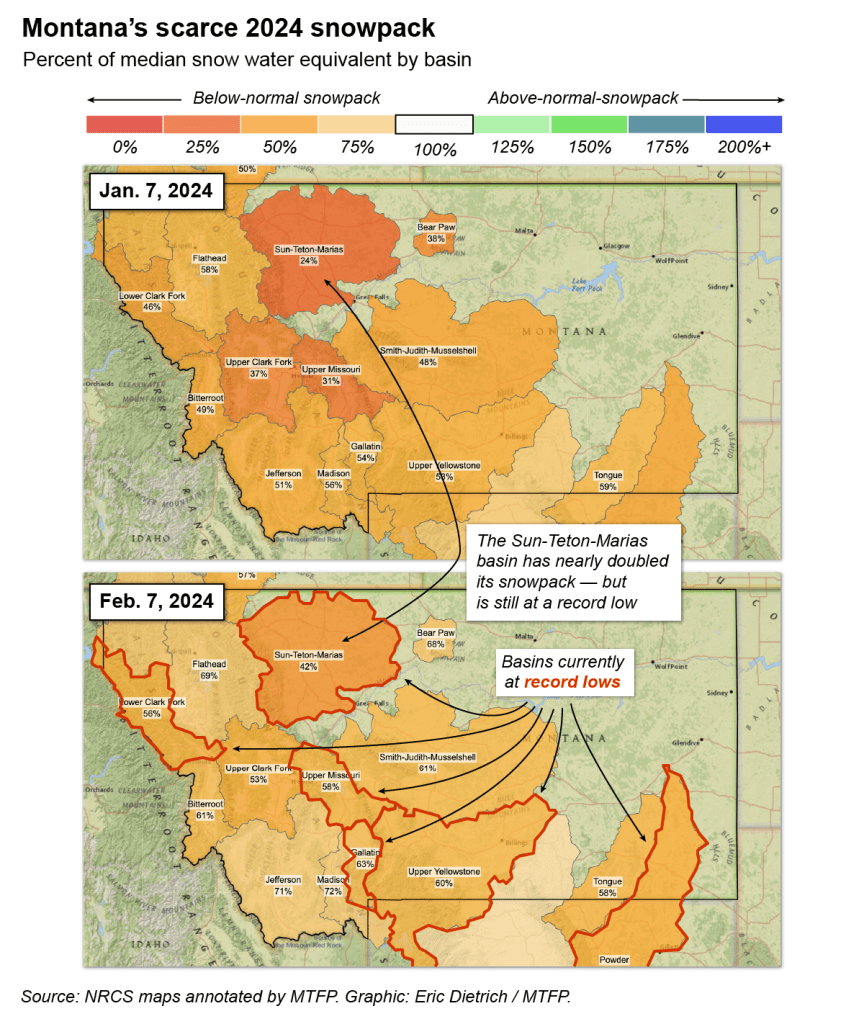Mon - Fri 8:00 - 6:30
Mon - Fri 8:00 - 6:30


The MT Lowdown is a weekly digest that showcases a more personal side of Montana Free Press’ high-quality reporting while keeping you up to speed on the biggest news impacting Montanans. Want to see the MT Lowdown in your inbox every Friday? Sign up here.
The results of several banner races in Montana’s 2024 elections may well hinge on Cascade County, a noted swing county and home to Montana’s third-largest city, Great Falls. But an ongoing local dispute over election administration has raised a particularly fundamental question: Who will be in charge of ensuring the votes are counted correctly?
Historically the duties of running local elections fell to the county’s elected clerk and recorder, but the county commission stripped current clerk Sandra Merchant of those duties in December following allegations that she’d mishandled local elections throughout 2023. The year-long saga has pitted county voters against one another over wildly differing views of how elections should be run and who should be running them.
Cascade County’s three commissioners interviewed four candidates this week for the newly created position of commission-appointed election administrator. The slate of candidates included former Great Falls Association of Realtors CEO Terry Thompson, post office supervisor and vocal Merchant supporter Nancy Donovan, and two longtime veterans of the clerk’s office: former deputy clerk Lynn DeRoche, and former 16-year elected clerk Rina Moore, who lost to Merchant in the 2022 election on a slim 36-vote margin in a hand recount.
Merchant’s most ardent supporters are already demanding she be reinstated, arguing that the commission’s actions robbed Cascade County voters of their voice in who runs their elections. Now, Moore’s presence in the applicant pool — along with her former deputy’s — has fanned the flames, with critics taking to public comment this week to criticize Moore’s past actions and her eligibility for the post. The new appointment is described as non-partisan. Moore was elected previously as a Democrat, and has filed as a Democratic legislative candidate this year — a race she said she’ll drop if the commission appoints her.
Speaking with MTFP this week, Moore said she’s aware there are some voters who will remain skeptical, even critical, of her prospective return to the county elections office. She pushed back on that criticism, however, defending her tenure and describing the alleged issues that have plagued the department since her departure as “heartbreaking.” Moore applied for the new position, she said, not as part of some grand cabal but because it was “the right thing to do.”
“I have an open process and I’m trying to win back everybody’s faith after the past year,” she said.
The local debate over election administration in Cascade County has energized community members on both sides. But its potential impact extends well beyond the county’s borders. Democratic U.S. Sen. Jon Tester won the county by 1,869 votes in 2018 — a margin that contributed to his statewide 17,913-vote win over Republican challenger Matt Rosendale. Since then, the county has shifted to the political right, electing no Democratic legislators in either of the past two state election cycles. With narrow Republican-Democrat splits in Congress, and Tester among the most vulnerable Democrats in the nation, it’s possible Great Falls area voters could end up deciding who controls the U.S. Senate. The resulting national scrutiny could fall on whoever Cascade County’s commissioners select.
—Alex Sakariassen, Reporter

A young supporter waves a sign for Matt Rosendale at the State Capitol in Helena on Friday, Feb. 9, 2024. Earlier that morning, the eastern Montana Republican congressman officially filed his campaign paperwork to run for the U.S. Senate seat currently held by incumbent Democrat Jon Tester.
Child welfare cases are explicitly confidential in Montana — a part of state law intended to protect the privacy of parents and children involved in what are often very fraught legal proceedings. But a fractious, months-long child protection case out of Glasgow, involving a transgender teen and non-affirming, outspoken parents who lost custody last year after opposing an out-of-state psychiatric referral, is pushing that principle to the breaking point.
Since the case began last August, Todd Kolstad and Krista Cummins-Kolstad, the teen’s birthfather and stepmother, have not shied away from sharing their family’s story, including intimate details about their child’s gender identity and medical information: to Montana Free Press; to supporters, in a 17-minute Facebook video in January; to a statewide talk radio program; to a Canadian magazine, Reduxx; to conservative microphone-wielder Megyn Kelly.
Just one of those bouts of public commentary was enough to garner a strong rebuke from Valley County District Court Judge Yvonne Laird, who, in a Jan. 18 ruling, ordered the Kolstads to remove the video they had posted to Facebook and refrain from “disclosing any further records or reports, or making any statements or interviews, in any social media or news media (electronic, print, video), in any unauthorized manner regarding the Youth’s physical or mental health, state of mind, or involvement in the above referenced dependency and neglect matter, absent express permission from this Court.”
That order was shared with MTFP by the Kolstads the same day it was issued. In a phone call the following weekend, Cummins-Kolstad said the couple intended to keep speaking out, despite the judge’s warnings about being found in contempt of court.
“In for a penny, in for a pound,” she said. “I already broke the rules so, whatever. Might as well break the rules big.”
In the following days and weeks, the Kolstads’ case swept into a national spotlight as prominent conservative social media commenters stoked a wave of outrage, in some cases accusing the state of “kidnapping” the teen and pursuing gender-affirming care against parental wishes. Gov. Greg Gianforte responded by trying to rebut the allegations on X, the social media platform formerly known as Twitter, saying state child welfare officials had acted appropriately but without disclosing specific details to back that assertion.
The Kolstads appealed to the Montana Supreme Court this week, asking the justices to stay Judge Laird’s “gag order” to allow them to respond to the governor’s response, which they argued amounted to a “smear campaign” against them. In their legal filings, they cited both Gianforte’s formal comments, and a choice “retweet” from his communications director, Travis Hall, which amplified another commenter’s suggestion that child removals typically only happen in cases of serious abuse or neglect.
“The gag order against the parents is an unconstitutional prior restraint and should be vacated immediately so that they may tell the public the truth without being jailed,” the lawsuit said.
The court dismissed the Kolstads’ motion within 24 hours, pointing to, in part, technical issues with the filing. The ruling also noted that the couple had not yet been penalized for violating the court’s order and was slated to appear in a hearing before Judge Laird on the very subject in late February.
“We cannot determine that supervisory control is warranted at this stage of the proceeding and upon this record,” the ruling said. “No mistake of law or emergency factors have been demonstrated.”
The following day, the Kolstads’ attorney, Matthew Monforton, responded by re-filing the lawsuit to correct the deficiencies in the first appeal and again pushing for the justices to stay Laird’s ruling. As of Friday morning, the court has not responded.
—Mara Silvers, Reporter
Mid-January and early February storms brought some much-needed snow to the region, but a third of Montana’s basins continued to post record-low snowpacks as of Feb. 7, a situation likely to produce low summer streamflows and uncomfortably dry forests heading into fire season.

The deficit is most pronounced east of the Continental Divide, according to data from the Natural Resources Conservation Service. The Sun-Teton-Marias, Upper Missouri, Gallatin, Upper Yellowstone and Powder basins all saw lower-than-average precipitation during the month of January and snowpacks in those basins remain at record low levels.
Even normal precipitation for each of the next three months would leave many locations in Montana with a record-low snowpack by late April, according to the NRCS’s Feb. 1 monthly outlook report.
A bright spot in the agency’s summary? Two northwestern Montana basins, Flathead and Kootenai, pulled in enough moisture from well-positioned storms last month to bring them close to, or even above, typical January precipitation levels. Still, those storms weren’t enough to bring snowpacks in either basin up to typical levels for this point in the winter.
The widespread lack of snow is a wrench in the works for businesses that are reliant on winter snow or summer streamflows. Teton Pass Ski Area, for example, announced Thursday that it’s closing for the remainder of the season due to an “insurmountable” lack of snow, and last week organizers canceled a nearly four-decades-old central Montana dog sled race out of consideration for the safety of mushers and their dogs. Firefighters, irrigators, dam operators and tourism purveyors reliant on the state’s rivers and lakes are bracing for a dry, difficult summer, as well.
—Amanda Eggert, Reporter
A reader responded to last week’s MTFP story on the nearly 20 charges that are incorporated into NorthWestern Energy’s residential power bills, with a good question: Where, they wanted to know, are NorthWestern’s profits represented in those charges?
The Montana Public Service Commission, which regulates NorthWestern’s power bills, authorizes the company to assess power rates that include a measure of profit for the “rate base” infrastructure it owns — everything from power plants and transmission lines to natural gas production facilities and gas pipelines. That means a profit margin is baked into charges such as “Residential Transmision Delivery” and “Residential Distribution Delivery.”
The PSC’s decision in October to approve a rate hike that Montana Consumer Counsel, NorthWestern Energy and some of its largest customers negotiated allows the utility a return on equity of 9.65% for its electricity operations and 9.55% for its natural gas operations. The utility isn’t allowed a profit margin on some of its expenses, such as the property taxes it pays on its facilities and short-term energy market purchases.
—Amanda Eggert, Reporter
Amanda — Missoulian Sarah Aswell’s account of her therapist-aided psychedelic experience to help her process a series of personal and professional upheavals offers a descriptive, funny and highly readable take on a novel mental health treatment that’s having a moment in America.
Alex — It’s been a particularly brutal ski season for skiers and Montana ski areas alike. One of my personal faves, Teton Pass, has taken a welcomely candid approach via Instagram, posting videos of its dismal snow conditions and, ultimately, a letter this week announcing its owner’s tough decision to end operations for the winter.
JoVonne — Meteorologist Ryan Dennis with KRTV features a weekly weather rookie where kids from kindergarten to eighth grade can have a chance to be in front of the news camera and deliver the weather report. This week 7-year-old Araya shared Thursday’s snowy forecast!
Mara — Huge shout out to Nora Mabie at Lee newspapers for her series about disparities in Native American life expectancies in Montana, Gone Too Soon. The whole project is worth a read, in part because of Mabie’s knack for representing the intimate details of people’s lives with profound respect and empathy.
Eric — There are some days I really miss being a city hall reporter. The only-in-Bozeman scandal playing out over the last two weeks, after someone leaked a Zoom video recording of the city manager saying less-than-tactful things on various topics, has produced a few of them. As the Bozeman Daily Chronicle reports, he’s now on administrative leave while the city commission sorts out his fate.
*Some stories may require a subscription. Subscribe!
The post National stakes for a county job in Great Falls appeared first on Montana Free Press.
'It's ridiculous': Upstate customers share concern...
Alec Baldwin had ‘no control of his own emotions...